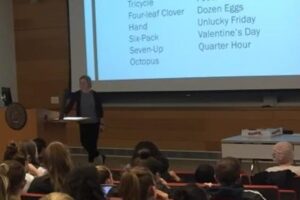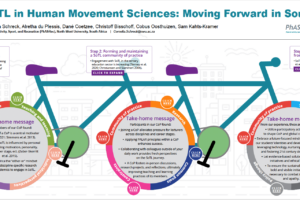ISSOTL Conference Pedagogy
- Posted by ISSOTL Admin
- Categories Blog
- Date January 3, 2018
- Comments 0 comment
ISSOTL conferences convene faculty members, staff, and students from across the disciplines and around the world as a community that fosters inquiry and disseminates findings about what improves and articulates postsecondary learning and teaching. This purpose leads to an inherently complex conference culture: participants with diverse backgrounds and common goals. ISSOTL conference participants bring high aspirations to do important work—to improve learning and teaching in higher education and to contribute to what’s known about meaningful student learning. We also believe that we are working together (or at least side-by-side) toward these goals. Over time, these assumptions have led to a conference pedagogy—an approach to knowledge-sharing at the conference—that is scholarly, engaged, inclusive, and collegial.
We embrace the “S” of SoTL by taking a scholarly approach. In our conference sessions, we ground our work in relevant literature and connect it to significant issues in learning and teaching that matter to other conferees. Recognizing that SoTL is the common ground for everyone at the conference, we also situate our work within the field of SoTL, implementing, reflecting on, and problematizing its “principles of good practice” (Felten, 2013). We are also intellectually humble, curious about what we don’t know, eager to learn something new, and aware that our individual inquiries won’t lead to an answer that applies to all settings.
We are engaged with our audiences, and share our work interactively. In this way, how we present is also scholarly, or based on evidence-based teaching practices. We may have some slides (or a poster), prepare handouts to capture our main points, and read aloud an occasional excerpt, but our presentation styles—regardless of session type—encourage conversation, facilitate interaction (or even active learning), solicit feedback, and of course invite questions.
Because SoTL is situated in the particular contexts of discipline, institution, country, culture, language, etc., ISSOTL invites and embraces diversity. Its conferences are international and multidisciplinary. Its participants include instructors, students, academic developers, and administrators. Some are SoTL veterans, some are newcomers, and many are in between. This diversity of perspectives and experiences is one of ISSOTL’s strengths. It also reminds us to clarify our specific identities, contexts, and approaches, as well as the implications of these particularities. While acknowledging these differences, we also work to foster conversations about teaching and learning that bridge the differences, and we make a deliberate effort to engage with people we don’t know. This bridging is also reflected in the fact that our conferences take place in varying locations around the world, and our presentations use engaging pedagogies and the common language of English.
We support this diversity by being inclusive, making our work accessible, and providing a variety of ways for people to engage. We make sure our presentations, activities, slides, and handouts are accessible to audiences with varying intellectual, sensory, and physical needs. We explain our approaches and our contexts, define our terms and avoid unnecessary jargon, abbreviations or technical language, pace our presentations appropriately, and offer alternative formats for engaging with us and our materials (e.g., describe our presentation visuals, offer digital or paper text to augment spoken delivery, take written questions [index cards or e-polling] as well as spoken ones, bring materials to the audience rather than expect them to easily move around the room).
Because we are committed to ISSOTL’s diversity, we are collegial in ways that express inclusivity. We listen across differences, asking what we can learn from others about our own situations. We ask questions that call for answers by multiple scholars from a variety of cultural and disciplinary contexts. We strive to make our fellow conferees feel welcome in the field of SoTL while also maintaining space for respectful critique as we try to make sense of SoTL’s contradictions and messiness.
ISSOTL Conference Pedagogy at the Conference
Materials from the conference call for proposals provide some guidance on how this conference pedagogy is part of specific sessions. The descriptions of the format and methods for the different kinds of presentations, as well as the criteria for reviewing proposals, highlight the characteristics and typical components of ISSOTL’s conference sessions.
Types of Presentations at ISSOTL Conferences
Panel Discussions
Panel discussions are particularly appropriate for topics that benefit from multiple perspectives, including disciplinary, institutional, and national perspectives. The goal for panel discussions is to provide panelists and audience members the opportunity to exchange insights, engage in discussion, and learn from each other’s experiences, so panel sessions will include at least 20 minutes for discussion among panelists and audience members.
Papers
Single paper presentations are ideal for presentations on completed SoTL projects but also include topics about or related to SoTL itself. The goal of paper presentations is to provide presenters the opportunity to share knowledge and facilitate critical dialogue with conference participants. Single paper presentations will be combined into groups of three, and the final presenter will serve as session chair. Each paper will last a maximum of 30 minutes, including 10 minutes for questions and discussion.
Concurrent Workshops
These workshops offer an opportunity for hands-on work on a SoTL question, research method, or topic during the concurrent sessions of the conference. Workshops are highly interactive and demonstrate effective practices in both SoTL and workshop pedagogy.
Posters
Posters present preliminary SoTL work, completed projects, or considerations of the field of SoTL in general. To inspire detailed dialogue and critical engagement, at least one author will attend the poster session to present and discuss the work with other conference participants. The poster session has become a central and lively component of ISSOTL conferences.
Criteria from the Proposal Submission Process
Questions and Rationale
- Important question(s) related to SoTL, the conference theme, and/or the conference threads are identified, articulated, and explored.
- An understanding of SoTL issues and/or existing scholarship in the field is demonstrated.
Theory/Methods/Framework/Models
The theories/methods/frameworks/models being used are explained and justified.
Outcomes and Insights
- Evidence and/or findings are reported.
- A description of how the work contributes to the understanding or practice of SoTL is provided.
Reflective Critique
A critical/reflective evaluation of the work is offered.
Audience Engagement, especially for workshops
- Planned opportunities for active audience engagement in the session are described.
- Opportunities for audience participation in the discussion are included.
- Effective pedagogical practices are demonstrated.
This statement was written in July 2017 by Nancy Chick and members of the ISSOTL Board of Directors: Sarah Bunnell, Peter Felten, Bettie Higgs, Aaron Long, Karen Manarin, Beth Marquis, Katarina Mårtensson, Kelly Matthews, Jessie Moore, and Lauren Scharff. It will evolve to meet the needs of the Society and its conferences.




